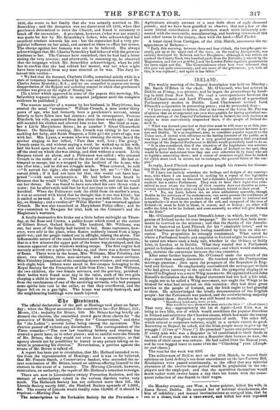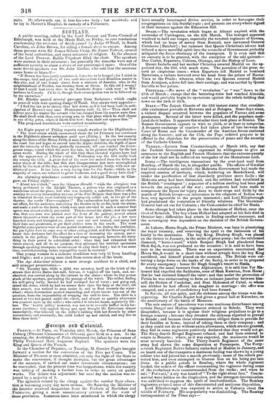IRELAND.
The weekly meeting of the Repeal Association was held on Monday ; Mr. Smith O'Brien in the chair. Mr. O'Connell, who had arrived in Dublin on Friday, was present ; and he began the proceedings by hand- ing in 600/. from New York. He read a correspondence between the Earl of Charlemont and Lord Ffrench, on the subject of a periodical Parliamentary session in Dublin. Lord Charlemont invited Lord Ffrench's coiiperation in promoting peace ; and he proceeded thus- " I have every reason to believe, that at the time of the Union Mr. Pitt was of opinion that an arrangement was even then possible for having periodical ses- sionsor sittings of the Imperial Parliament held in Ireland, for such business as might he must conveniently despatched there, if the people of Ireland de- sired it.
What was deemed practical at that time must be still more so at this, con- sidering the facility and rapidity of the present communication between Lon- don and Dublin. It is Is important, also, to conciliate popular support to the Union now, if viewed with reference to the lasting interests of the public, as it was then ; and there appears to be a very general persuasion that occasional meetings of the Imperial Parliament in Dublin would powerfully tend to do so. • It is also considered, that if the attention of the Legislature was uninter- ruptedly given from time to time to the affairs of Ireland on the spot, they would be better understood than they can ever otherwise be by those who are to legislate concerning them ; and a course of measures might thus be looked for which must tend to secure, not to endanger, the general fabric of the em- pire."
In reply, Lord Ffrench stated at great length his reasons for dissent- ing from the proposition-
" If I have not entirely mistaken the feelings and designs of my country- men, with whom I am associated in seeking for a repeal of the legislative union, they require not an itinerant but a domestic Legislature—not merely a resident but a native Parliament. They wish to have their legislation com- mitted to men whom the history of their country does not describe as inve- terately inimical to their race—as high in hereditary hatred to their creed. • * • • No, my Lord, believe me, an alien ambulatory assembly, though Dublin be the terminus of its ambulaerum, can never possess the confidence of Irishmen. The Parliament in which they will confide must be national and sympathetic—it must be the product of the soil, and composed of the men of Ireland—it must be Irish in blood, in accent, and in feeling: no other will suffer the Irish to be for Ireland, and most assuredly no other will give Ireland, to the Irish."
Mr. O'Connell praised Lord Ffrench's letter ; in which, he said, "the genius of Ireland spoke its true language." He moved that both docu- ments be inserted on the minutes ; and that the thanks of the Associa- tion be bestowed on Lord Ffrench for his " admirable letter," and to Lord Charlemont for the kindly feeling manifested by him on this oc- casion. The proposition he strongly condemned. What cared he where a Parliament hostile and ungenial to Ireland might be situated?— he cared not where such a body met, whether in the Orkney or Scilly Isles, in London or in Dublin. What they wanted was a Parliament genial to Ireland—devoted to Irish interests ; and which would niaintain, nay, eternize the connexion between the two countries. After some further business, Mr. O'Connell made the speech of the day—more than usually discursive. He touched upon the Presbyterian marriage question ; then upon the prospects of the Repealers in Eng- land and Ireland. He emphatically contradicted the newspaper-writers who had given currency to the opinion that the sympathy displayed to himself in England was a mere Whig manoauvre. He applauded Lord John Russell's declaration that the Repeal traversers had not had a fair trial. It ought not tube called a Whig movement, nor ought the Whigs to be blamed for what had occurred on this occasion : they had done great service to the people of Ireland, and the Irish ought to feel grateful to them. He acknowledged the kindly demonstration of the English people : but the Parliament was packed, and the overwhelmiug majority was against them : therefore he was still bound to exclaim, " Hereditary bondbrueu kuow ye not, Who would be free, theunehes must strike the blow i" (bowl cheers.) That very day—appropriately the hat of April—Lord Eliot was to bring in two bills, one of which would annihilate the popular franchise in Ireland and substitute the Chandos clause, which had made the county representation of England a representation of serfs. The other bill, which related to corporate reforms, might to a certain extent do good. Recurring to Repeal, he asked, did the Irish people mean to give up the struggle? (Cries of •• Never 1) He preached "peace and perseverance?' If every man who was a Repealer in '43 contributed to their funds in '44, and if every man who was not a Repealer then became so now, the success of their cause was certain. He had called 1843 the Repeal year, and he now begged leave to name 1844 the " Clinching " year. (Laugh- ter and cheers.)
The rent for the week was 929/.
The millowners of Belfast met on the 27th March, to record their opinions on Lord Ashley's ten-hour amendment on the late Factory Bill. Resolutions were passed unanimously, to the effect that any material alteration of the twelve-hours period would be prejudicial to the em- ployers and the employed ; and that the operatives themselves would much rather work twelve hours a day than ten hours with the conse- quent reduction of one-fourth in their wages.
On Monday evening, one West, a house-painter, killed his wife, in Essex Street, Dublin. He accused her of habitual drunkenness, she him of infidelity ; and mutual incriminations so enraged him, that he ran to a closet, took out a cane-sword, and killed her with repeated
• stabs. He afterwards ran it into his own body ; but he lay in Mercer's Hospital, in custody of a Policeman.



























 Previous page
Previous page